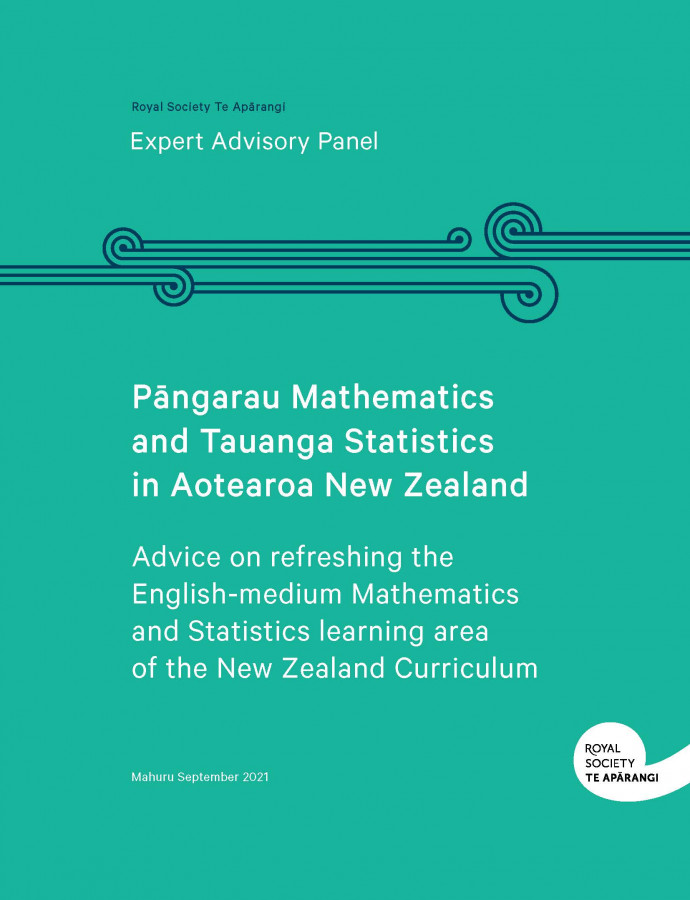News
Published 3 October 2021Independent report on improving maths and stats learning finds investment and changes needed at virtually all levels of the education system

A report released today on improving mathematics and statistics learning in Aotearoa recommends sweeping changes across the education system.
The report was produced by an expert advisory panel comprised of mathematicians, statisticians, economists and mathematics educators. It was convened by Royal Society Te Apārangi to provide independent advice to the Ministry of Education on the English-language mathematics and statistics curriculum refresh.
Specifically, the panel was asked to focus on defining the mathematics and statistics that learners need to know and when they should know it by; consideration of what ‘enough’ mathematics and statistics might be for critical engagement with society; the relationship between numeracy and mathematics; what the essential ‘big ideas’ of mathematics and statistics in schooling should be; and the panel’s views on progress and assessment.
While the report does comment on these topics, it takes a broader approach, as explained by panel chair Distinguished Professor Gaven Martin FRSNZ, a leading New Zealand mathematician and professor of mathematics at Massey University. “The panel quickly discovered that these elements of curriculum design were less material to ākonga student progress and achievement in Aotearoa New Zealand than the many complex factors that surround their engagement with mathematics and statistics in schools.
“We became concerned that suggesting curriculum changes alone, without acknowledging and addressing key aspects of the context in which the curriculum is being taught and learned, might support the conclusion that simply changing the official curriculum would leverage transformation in ākonga student outcomes. The panel does not believe it will.
“Indeed, nor does the Ministry of Education. Minister Hipkins first signalled the need for systemic change in 2017 and the Ministry has work underway on a wraparound strategy to drive improvement and change in mathematics education, alongside the mathematics and statistics curriculum refresh.
“We sought for this report to provide critical evidence to support the broader work on improving mathematics and statistics learning in this country. We aimed to tease out some of the most important relationships and dependencies between the written curriculum and student learning experiences as we see them.
“Investing in improving mathematics and statistics outcomes for Aotearoa New Zealand’s learners will bring a huge range of benefits to us all, now and into the future. Failing to invest now will cost us all, as a society, a great deal. This is not just about learners, teachers and schooling, it is about the wellbeing of Aotearoa New Zealand as a nation,” Professor Martin says.
The report makes 14 recommendations that are centred on four themes:
- Slippage – how many ākonga students fall away from trajectory described by the current Mathematics and Statistics curriculum.
- Teacher discipline and pedagogical knowledge – this addresses teachers knowledge of mathematics and statistics itself and the teaching of mathematics and statistics. It considers both the necessity of, and difficulty in supporting and enhancing teachers discipline and pedagogical knowledge.
- Leadership – this recognises the need for a more centralised approach to support coherence and clarity around teaching and learning in mathematics and statistics education.
- Inequity –this responds to evidence that our current mathematics and statistics education system as a whole perpetuates, and indeed grows, inequity.
“Inequity must be addressed specifically within the context of mathematics and statistics teaching and learning”, says panel member Associate Professor Fiona Ell, a mathematics educator from the University of Auckland.
“The current state of mathematics and statistics education in English-medium schools is the product of a deeply complex system working at multiple levels. Teachers are at the heart of our education system, they have met all the requirements placed on them to be fully qualified, and cannot be blamed for how the system works.
“It’s the panel’s view that if Aotearoa New Zealand wants equitable outcomes and enhanced achievement for our ākonga students, we need substantial, considered investment in mathematics and statistics education, and change at virtually all levels of the education system.
“The panel believes that all children in Aotearoa New Zealand, irrespective of their individual life circumstances, must be given opportunities to develop sufficient competence and confidence in mathematics and statistics that enables them to lead rewarding and fulfilling lives.
“Given the right circumstances, everyone can learn mathematics and statistics, and a significant proportion can excel,” Associate Professor Ell said.
The panel also recommends that a group of experts in Māori-medium mathematics be convened to discuss the current state of pāngarau education, collate evidence and make independent recommendations to the Ministry of Education.
“There has been a tendency for agencies to frame initiatives in terms of mainstream education in the first instance and to then assume that these will naturally ‘translate’ to the Indigenous language education context,” says panel member Associate Professor Tony Trinick, who researches Indigenous mathematics education at Te Puna Wananga, The University of Auckland.
“Proponents of Māori-medium education have successfully argued that initiatives must be derived from their own educational goals, practices, and contexts, centred on a commitment to Indigenous language and knowledge revitalisation via schooling.
“This is why the panel is recommending an independent look at Māori-medium pāngarau education separately, rather than assume our recommendations in this report would apply.”
View report Pāngarau Mathematics and Tauanga Statistics in Aotearoa New Zealand.
